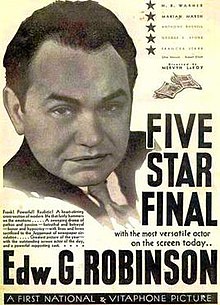Five Star Final
| Five Star Final | |
|---|---|
 1931 Theatrical Poster | |
| Directed by | Mervyn LeRoy |
| Written by | Louis Weitzenkorn (play) Byron Morgan Robert Lord |
| Produced by | Hal B. Wallis (uncredited) |
| Starring | Edward G. Robinson |
| Cinematography | Sol Polito |
| Edited by | Frank Ware |
Production company | |
| Distributed by | Warner Bros. Pictures |
Release date |
|
Running time | 89 minutes |
| Country | United States |
| Language | English |
Five Star Final is a 1931 American Pre-Code film about crime and the excesses of tabloid journalism. The picture was written by Robert Lord and Byron Morgan from the play of the same name by Louis Weitzenkorn, directed by Mervyn LeRoy, starring Edward G. Robinson, and featuring H. B. Warner, Marian Marsh, Oscar Apfel, Aline MacMahon, Frances Starr, Ona Munson, and Boris Karloff.
The title refers to an era when competing newspapers published a series of editions during the day, in this case marking its final edition front page with five stars and the word "Final." "Five Star Final" is also a font similar to those often used in newspaper headlines.
Warners remade the film in 1936 as Two Against the World, also known as One Fatal Hour, starring Humphrey Bogart in Robinson's part and set in a radio station instead of a newspaper.[1]
The film was nominated at the 5th Annual Academy Awards in 1931/1932 in the category of Outstanding Production, which later became known as the Academy Award for Best Picture.
Plot
Joseph W. Randall (Edward G. Robinson), the city editor of a tabloid newspaper, reluctantly agrees when publisher Bernard Hinchecliffe (Oscar Apfel) plans to boost circulation with a restrospective series on a 20-year-old murder and scandal, involving a secretary, Nancy Voorhees (Frances Starr), who shot the man who got her pregnant and then refused to marry her. Nancy is now married to Michael Townsend (H. B. Warner), an upstanding member of society, and has a daughter, Jenny (Marian Marsh), about to marry the son of a socially prominent family, Philip Weeks (Anthony Bushell). She reacts with horror at the renewed interest in the scandal she had put behind her.
To dig up dirt about Nancy, Randall assigns an unscrupulous reporter, "Reverend" T. Vernon Isopod (Boris Karloff), who masquerades as a minister and wins the confidence of the bride's parents on the eve of the wedding. They confess to him their concerns that Nancy's past will come out, and he uses their information to write a story that Randall prints. Nancy tries to get Randall to back away from the story, but when he refuses she kills herself, as does her husband shortly afterwards. Phillip's parents pressure him to call off the wedding to Nancy's daughter Jenny, but he refuses and stands up to them. An enraged Jenny threatens Randall at gun point, attempting to force him to take responsibility for the deaths of her mother and father, but Philip shows up and calms her down. A guilty Randall denounces Hinchecliffe as a hypocrite and decides to quit the paper, as does his secretary Miss Taylor (Aline MacMahon), who's been in love with him for years.[2][3][4]
Cast (in credits order)
- Edward G. Robinson as Joseph W. Randall
- Marian Marsh as Jenny Townsend
- H.B. Warner as Michael Townsend
- Anthony Bushell as Phillip Weeks
- George E. Stone as Ziggie Feinstein
- Frances Starr as Nancy (Voorhees) Townsend
- Ona Munson as Kitty Carmody
- Boris Karloff as T. Vernon Isopod
- Aline MacMahon as Miss Taylor
- Oscar Apfel as Bernard Hinchecliffe
- Purnell Pratt as Robert French
- Robert Elliott as R.J. Brannegan
- Cast notes
- This was the first film that Marian Marsh made under that name: she had previously appeared as "Marilyn Morgan".[1]
- Aline MacMahon made her film debut in Five Star Final.[1]
Production
The film was based on the play written by Louis Weitzenkorn after his stint as editor of Bernarr MacFadden's New York Evening Graphic, a sensationalist tabloid of the 1920s. The play ran for 175 performances on Broadway in 1930-1931.[5]
Producer Hal B. Wallis wanted the press room set to appear authentic, and sent Warners' staff members to make sketches of two actual newspaper offices to aid in the design of the set.[1] The film was in production from April 14 through May 11, 1931.[6]
The movie was made the same year Little Caesar was, Robinson's breakthrough film. Boris Karloff also made Frankenstein later that year.
Awards and honors
Five Star Final was nominated for an Outstanding Production Academy Award in 1931/1932 at the 5th Annual Academy Awards (Outstanding Production is known today as 'Best Picture'),[7] and was named by Film Daily as one of the Ten Best Films of 1931.[8]
Notes
- ^ a b c d TCM Notes
- ^ TCM Full synopsis
- ^ Allmovie Plot synopsis
- ^ Stephan, Ed Plot summary (IMDB)
- ^ Five Star Final at the Internet Broadway Database
- ^ IMDB Box Office/Business
- ^ TCM Awards
- ^ Allmovie Awards
